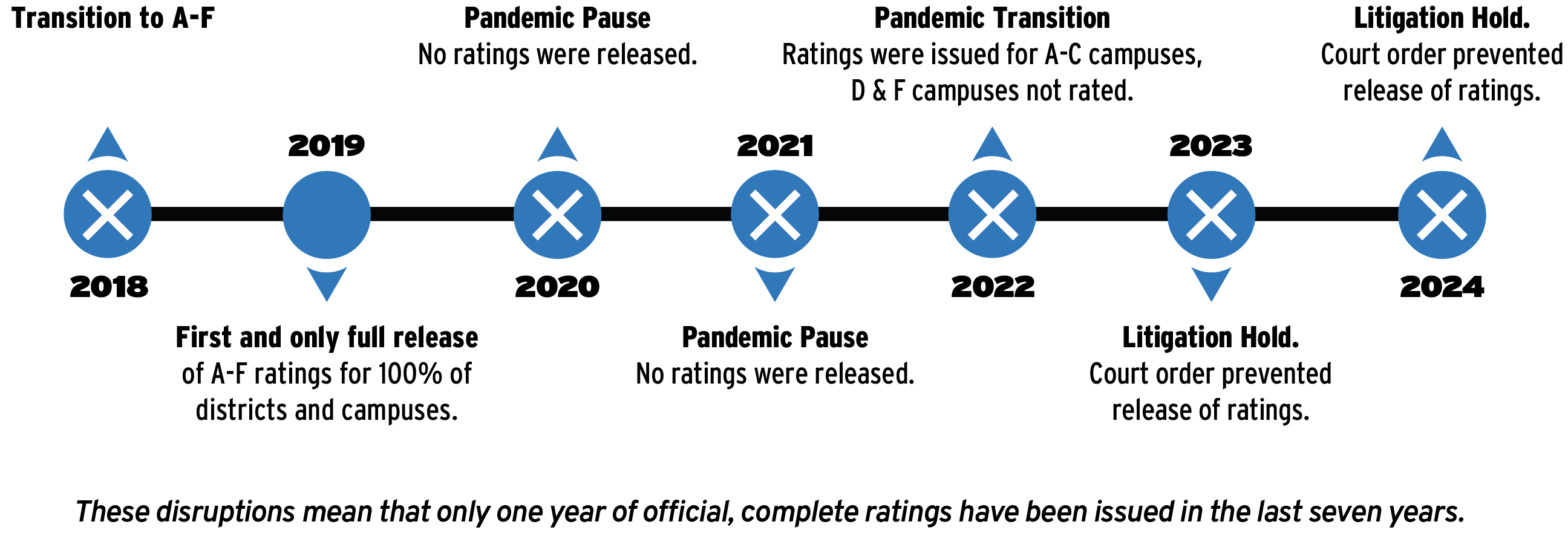
2025 POLICY PRIORITY
PROTECT ASSESSMENT AND ACCOUNTABILITY.
The Problem: Texas’ Assessment & Accountability System Has Been Consistently Disrupted
In 2017, the state created the A-F Accountability system after extremely thorough consideration and recommendations from the Commission on Next Generation Assessments and Accountability. Since then, the system has been disrupted in a multitude of ways:

YOUR DISTRICT PROFILE
Your District Profile features updated 2023 campus level A-F and STAAR at grade level results by campus across your district
Why It Matters
The Texas Assessment & Accountability system serves multiple purposes.
DATA: It provides reliable, valid, comparative data on student and district performance, disaggregated by student subgroups such as race, household income, disability status, etc.
TRANSPARENCY: It provides transparency to students and families about student and district performance.
GOVERNANCE: It allows state and district leaders to make informed decisions on school strategy and investments.
IMPROVEMENT: It identifies when schools are in need of improvement, and encourages and/or requires intervention to support struggling districts.
Accountability is not a fool-proof solution to “fixing” education; instead, it is information that ensures we are actively working to “raise the bar” on student learning. The constant disruption to this system has prevented this information from being available to drive actionable and meaningful change and inform future policy decisions.
Good News: The state is currently exploring reform
The Texas Through-Year Assessment Pilot has potential.
In 2019, in response to districts’ concerns about the “high-stakes” nature of summative assessments, the Legislature created a Texas Through-Year Assessment Pilot (TTAP) to create and test a through-year assessment model that could potentially replace the STAAR.
After rigorous testing and development, the pilot was finally able to launch in 2022-2023, offering through-year tests in Grades 6-8 math and Grade 8 social studies. As it enters its third year, the pilot will be adding Grade 3 math. Over 100 school districts have signed up to participate.40 The pilot shows promise, but ultimately many questions remain as to whether it’s capable of replacing the STAAR, and how it can do so with fidelity and at scale. Before making any significant changes to assessment, the pilot should operate for a few more years to accurately inform policy.
This system is not perfect, but any reform must be outcomes-focused and rooted in evidence.
While we argue the system is important and should be protected, we believe it should be updated in the spirit of continuous improvement. However, little is truly known about the effects of potential policy changes and might lead to negative unintended consequences.41 For example, certain non-academic indicators may unintentionally exacerbate inequities by rewarding districts who have more resources. Any additional indicators should be thoughtfully researched and crafted to avoid “muddying up” the system.
What To Do In 2025
We urge the Legislature to:
- Not make any major changes to assessment while the Texas Through-Year Assessment Pilot is in motion
- Ensure that A-F ratings are administered
- Keep the accountability system outcomes-focused
FOOTNOTES
40. Texas Through-Year Assessment Pilot. Texas Education Agency.
41. Hamilton, Laura. Asking the Right Questions About Using Nonacademic Indicators for School Accountability. American Enterprise Institute (AEI), March 2021.